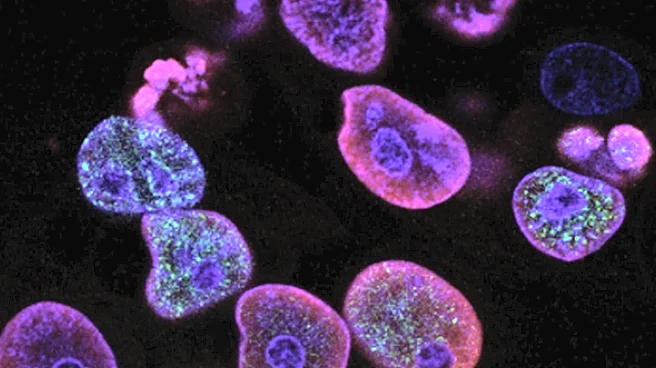What's Happening?
Recent research has explored the effects of mesenchymal stromal cells (MSCs) on systemic lupus erythematosus (SLE), a chronic autoimmune disease. The study found that MSC transplantation in mice models of SLE triggers extracellular vesicle (EV) storms, which are cell type-specific and dose-dependent. These EV storms are primarily derived from recipient bone marrow neutrophils and are associated with therapeutic efficacy. The research indicates that MSCs induce neutrophil aggregation in the bone marrow, which releases EVs through the ICAM1/Rab11b pathway. This process appears to modulate the balance between Th17 and Treg cells, which are crucial for immune regulation. The findings suggest that MSC-induced EV storms could be a key factor in the therapeutic effects of MSCs in treating SLE.
Why It's Important?
The study's findings have significant implications for the treatment of systemic lupus erythematosus, a disease that affects millions worldwide and has limited treatment options. By identifying the mechanism through which MSCs exert their therapeutic effects, this research could pave the way for more effective treatments. The modulation of Th17/Treg balance through EV storms offers a novel approach to managing autoimmune responses in SLE patients. This could lead to improved patient outcomes and potentially reduce the reliance on current treatments that often have severe side effects. Furthermore, understanding the role of EV storms in MSC therapy could enhance the development of cell-based therapies for other autoimmune diseases.
What's Next?
Future research will likely focus on further elucidating the molecular mechanisms behind MSC-induced EV storms and their role in immune modulation. Clinical trials may be conducted to assess the efficacy and safety of MSC therapy in human SLE patients, potentially leading to new treatment protocols. Additionally, researchers may explore the application of this mechanism in other autoimmune diseases, broadening the scope of MSC therapy. The identification of specific EV cargo, such as docosahexaenoic acid (DHA), that contributes to the therapeutic effects could also lead to targeted therapies that enhance MSC efficacy.
Beyond the Headlines
The ethical implications of using MSCs in therapy, particularly regarding sourcing and manipulation of stem cells, will need careful consideration. Legal frameworks may need to adapt to accommodate new treatment modalities that arise from this research. Culturally, the acceptance of stem cell therapies may vary, requiring public education and engagement to address concerns and misconceptions. Long-term, this research could shift the paradigm in autoimmune disease treatment, emphasizing personalized and cell-based therapies.









